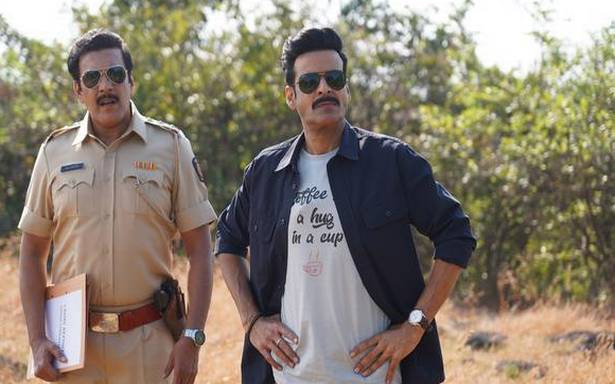Actor Manoj Bajpayee explains why he thinks like a migrant and talks about tackling a different genre in his upcoming film, Silence Can You Hear It
Over the years, actor Manoj Bajpayee has turned into Mr Reliable, one of those rare actors who can rise above a bad script and lend it some semblance of respect. Give him a well-written role though, and a sensitive director, and you can see him transform on screen — like he did in Gali Guleiyan, Bhonsle and even Amazon Prime’s The Family Man. In his next outing on Zee 5, Silence Can You Hear It, co-starring Prachi Desai and Arjun Mathur, we’ll see him playing a cop investigating the mysterious disappearance of a woman.
Bajpayee, the son of a farmer, has often said he thinks in Bhojpuri. Last September, he made headlines for rapping the number ‘Bambai main ka ba’, highlighting the plight of migrant workers. “The mindset of a migrant never changes, no matter how much you earn, how big a property you live in, how happy a family you have. It is a feeling of not belonging anywhere. It hangs in the air, neither here nor there. I’ve gone through that feeling,” he says, adding that this may be why he continues to try new things.
Edited excerpts from an interview done over voice notes, rich with his trademark pauses:
Your thoughts on Silence Can You Hear It and how you respond to the mystery/thriller/horror genre?
This is one genre I’ve not done and the script is fantastic. I’ve worked with Kiran Deohans [producer], who was the cinematographer of Aks. He’s prolific and his wife, Aban, had been wanting to direct a feature for a long time. She loves this genre and when she pitched the film to me, I wanted to do it as an actor and a friend. The experience of making it was amazing: the livewire cast, the fun, the hard work. Reports from the edit room are encouraging too.
A still from Gali Guleiyan | Photo Credit: Special Arrangement
You lost weight and immunity when shooting for Gali Guleiyan and said you felt you were becoming the performance. Are you involved at this level for every role?
When I am working on a film, that’s the only life for me at that point of time, and whatever that character demands we all go the extra mile to give it. My character in Gali… of a shopkeeper who observes people through a hidden camera, was one such. I could not afford to hold back. It [the character] was screaming out loud, so I had to go ahead and experiment, internally and externally. Somewhere on the 28th or 29th day, I started experiencing the sound of a whistle in my mind. I knew something was not right and we still had six days to go for my portion to get over. I requested Dipesh Jain [the director] to wrap up my scene in time and he, along with the producer, were very careful. I was almost on the verge of a breakdown and no one knew how to help. Dipesh kept getting me cold drinks to cool me down [laughs]. This, when all I possibly needed was to be put to bed and told to sleep. But it is worth it in the end.
This itch to perform, can you describe it?
I don’t know how to think of anything else, nor do I know when this madness of playing a character will go away. When I shoot, I don’t stay at home. I stay in a faraway hotel, so I can be secluded and in character. I don’t take messages or do interviews. I am not available to anyone but my family — we speak over the phone once or twice a week. They understand that the roles I do require this kind of aloofness and I am blessed that way. This itch is not an itch; it is a full-blown disease. I can’t describe it, but I feel complete fulfilment when I do a good scene. I feel a joy I don’t feel otherwise.
A still from Bhonsle | Photo Credit: Special Arrangement
You’ve often said you don’t like nostalgia — everyone’s comfort zone.
Living in the past makes you still. You’re mentally always trying to go back, and it discourages you from being happy in the present or to look forward to a greater experience. I go back to my village [Belwa in Bihar’s West Champaran], and realise that my feelings are not the same. They belong to a different time, age and atmosphere, and cannot be repeated.
Can you go back and watch your work without critiquing it?
I mostly don’t watch my work as I’m too blunt and brash a self-critic. I have respect for reviewers and critics, but I look at things very differently. Craft is something I’ve always worked on — my voice, speech, diction, the sur. I look for the small rhythms, small gestures, the notes in speech. I am very finicky, and brutally frank [with myself] so I don’t need anyone else to criticise me.
Having been in the industry for so long, does OTT help you carve new paths?
I came into the industry in the 90s. Doing one film your way was so difficult, like you were asking for the sky. Now, with OTT, there are so many offers, so many talented newcomers, superlative performers such as Pratik Gandhi, Pankaj Tripathi, Nawazuddin Siddiqui, Vijay Varma, Gulshan Devaiah, Jaideep Ahlawat and Rajkummar Rao. I am very glad they are doing well and creating a body of work they will be proud of. That has been my focus — creating a filmography that will give me some kind of satisfaction that I’ve done well.
Silence Can You Hear It premieres on Zee5 on March 26.
Source: Read Full Article


